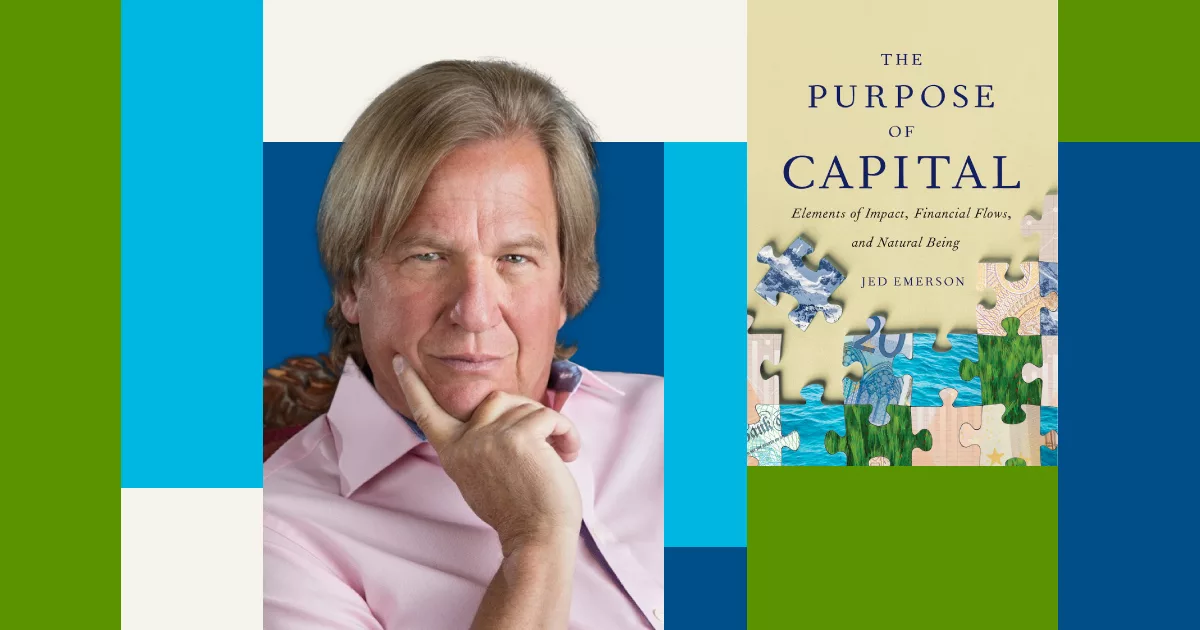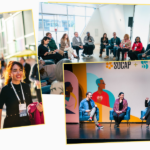A SOCAP guest post by Jed Emerson
Some thirty years past, together with many others, I joined you on a path of defining what this is and what it might become. We thought directing capital for change was new, but knew it was not. We convened and processed and arbitrated our ideas on what we’ve come to call impact investing, the latest gestation in a centuries-long incubation we thought we were the culmination of. In my SOCAP16 plenary talk, I reflected on where we stood in the larger span of history understood as centuries and not decades. I spoke of us each standing in the middle of a path we all travel.
Paths are tricky in that you walk alone together on a journey you think is original but is, in fact, well trod.
Try this:
“A path is something that can be followed, it takes you somewhere. ‘Linear.’ What would a path stand against? ‘No path.’ Off the path, off the trail. So what’s off the path? In a sense everything else is off the path. The relentless complexity of the world is off to the side of the trail. For hunters and herders trails weren’t always so useful. For a forager, the path is not where you walk for long. Wild herbs, camas bulbs, quail, dye plants, are away from the path. The whole range of items that fulfill our needs is out there. We must wander through it to learn and memorize the field—rolling, crinkled, eroded, gullied, ridged (wrinkled like the brain) holding the map in mind…For the forager, the beaten path shows nothing new, and one may come home empty-handed.” (1)
As we gather this autumn at SOCAP18, perhaps we ought to reflect on our path, as individual wanderers, as foragers and as a community of oldsters, newcomers and Others. We might consider how building new, more just systems requires strong inquiry into the deep roots of ourselves, and grounding the foundations of our ideological homes.
And, as we reflect, we could also consider where we might better direct our energies and to what end. A review of recent impact blogs, updates and reports would leave one believing our focus must first be external—How much capital do we have to work with? On what terms is it best managed? How do we assess its performance? How shall we finally define impact? And, everyone’s favorite: How much capital do I need to return to investors, to myself and, oh, yes—to impact?
Important questions all, yet only of primary interest if our focus is upon capital pools and financial tools, but not the actual, fundamental task of participating in the creation of Deep, and Mutual, Impact–concepts explored in The Purpose of Capital. Know that I understand these questions are of importance and must be answered, but we must also acknowledge that answers to questions such as these will shift and alter based upon our understanding of ultimate ends, goals and purpose. Will they not?
This question of fundamental purpose—the focus of my SOCAP17 talk—is an inquiry with which we, as a field, have yet to fully engage.
If we don’t start at the conclusion and begin at the end, our tools will be misapplied, our purpose foiled, since we won’t understand our ultimate goal as we continue to lock in upon interim opportunities, challenges and labors; chores of our immediate future as opposed to the future of Deep Time and sustained impact. If we keep looking into the current future as opposed to the ultimate future we will simply continue in our present efforts to build the Impact Brand—impact investing simply as a new investment style we may promote and from which we may profit—as opposed to as a form of capital resistance and Restorative Justice, much less a vehicle for the creation of true, Mutual Impact itself.
Martin Luther King, Jr., stated,
“Our scientific power has outrun our spiritual power.
We have guided missiles and misguided men.” (2)
Our focus on means versus ends, on tool versus task, directs us toward rational, logical, tactical and pseudo-scientific financial debates, when we live in a time of irrational, illogical and strategic madness; understandable yet insane. What we are confronting is not a deficit of innovation and solutions to be marketed to the masses as we seek to scale impact, but rather an engagement in fundamental analysis and critique of embedded, institutional racism, accepted practices of financial extraction and public perspectives based upon notions of scarcity and fear.
In the early days of the current administration’s reign, I cringed and raged and ranted. Today, I contemplate Caesar’s role as our collective Shadow and consider this an opportunity he offers us in ignorance (as in so much else) to go deeper, reflect more profoundly, and find a strength to carry Self and Other forward, higher and deeper, into a future we have yet to discover, but a future that awaits us nevertheless. I celebrate our opportunity to stop, adopt a contemplative posture as we move forward, and to reassess what we thought were impact investing’s foundational tenets and central conceptual frameworks.
Perhaps our notion of returns must be challenged…
A reconsideration of whether we begin this journey with exploration of the interior or exterior landscape is called for…or perhaps we simply need to revisit the good guidance of MC5 and “…kick out the jams, motherfucker!”
Consider this:
“We seek a new order of global impact economics even as we recognize modern financial capitalism as presently constituted will not be the vehicle to take us where we need to go. Those who dare call themselves impact investors, as we move from fringe to mainstream, must hold onto the historic origins of our revolutionary thought and seek to explode upon the stage of our world, as we collaborate in “blasting open…the continuum of history.” (3)
Yet, there is no single guidebook or training seminar we may attend. There is no curriculum or degree we may pursue. Ours is a process of external manifestation of internal journey and so we must call it that, understanding “scale” as a function of our settling down and in as opposed to up and out, for when we do, we may find our understanding of what “this” is will be radically off center from our current deliberations, precious pontifications and clever keynotes (my own included!).
The answers we seek are temporal and grounded within the context of our community’s journey and prospects. They are best discovered in collaboration with others and in comparison with the experiences, insights and wisdom of our fellow travelers. For this reason, while I love taking the stage to speak of my perspectives and grand ideas, this fall I’ve opted to take a different approach; talk less, listen more and be open to a process of my own evolution as being foundational to any effort to evolve our external condition—to change the world as one changes one’s self and to embrace the truths of others as parts of my own discovery of Truth.
How about this?
“…consider the notion that the purpose of having money may, in the end, have more to do with your managing that wealth on behalf of the Other than on behalf of your Self. And the further out you place your boundary of whom and what that Other is, the greater blended value you may create over the course of your life. Through the more effective management of your assets, the more informed you will be in terms of how best to allocate that capital and the more profound understanding of the total returns you may generate, positioning you to capture the most significant amount of value creation, the greatest overall financial and impact returns a life might offer.
By extension, when you expand your understanding of the boundary of Self, you could well die wealthier through investing in the Other than you may die by merely seeking to invest for the sole benefit of your Self.
Imagine that…” (4)
We will find our connection with the Other by expanding our sense of self to include community and ecosystem. And we will best do this by letting go of our preening posts to engage in true dialogue, to listen and hear the experiences of others in order to place our own in context, to see more together than we see alone.
And to live in the awareness that systems change begins at Home.
These reflections are informed by and excerpted from Emerson’s book, The Purpose of Capital: Elements of Impact, Financial Flows and Natural Being
The book is now available for free e-book download and reduced pricing of the paperback format. You are encouraged to share the e-book with your colleagues and networks and/or to order the paperback from your favorite independent bookstore.
Sources
- The Practice of the Wild, Gary Snyder, Counterpoint Press: Berkeley, CA.,1990., page 155.
- Dancing Standing Still: Healing the World from a Place of Prayer, Richard Rohr, Paulist Press: New York City, NY, 2014, 45.
- First part of quote is from The Purpose of Capital, page 59; closing quote is from Imagined Communities: Reflections on the Origin and Spread of Nationalism, Benedict Anderson, Verso Press: London, 1983/2016, 193.
- The Purpose of Capital, page 44/45.




